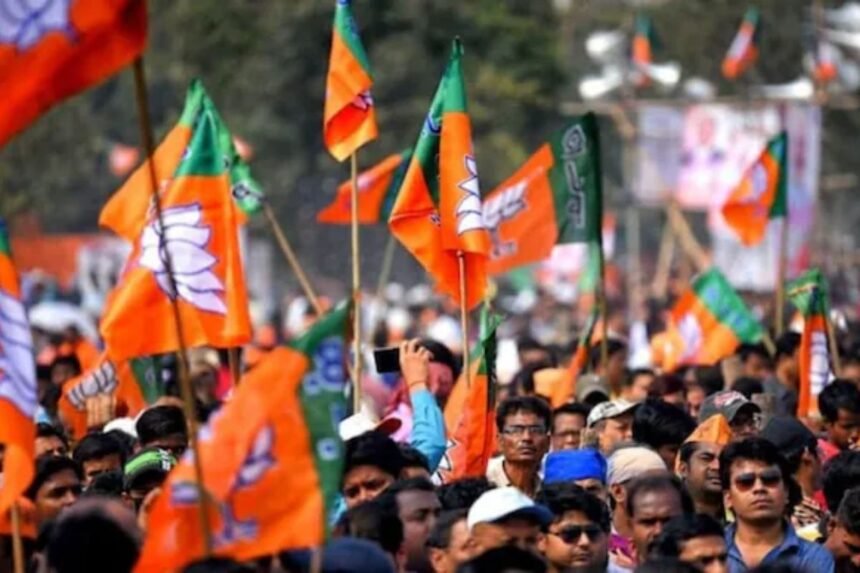The political landscape in Jharkhand has always been dynamic, but as the 2024 Assembly elections approach, the Bharatiya Janata Party (BJP) faces an internal conflict that could influence the outcome.
The party, known for its strong electoral strategies, is grappling with the emotional discontent of long-time workers who feel sidelined as new candidates are introduced to refresh the BJP’s image.
This growing sentiment of dissatisfaction among BJP’s grassroots workers, especially in constituencies like Hussainabad and Bishunpur, presents significant electoral challenges that could disrupt the party’s unity and momentum.
Emotional Conflict Among BJP Workers
BJP workers in Jharkhand have long been the backbone of the party, dedicating their time and effort to ensuring electoral victories.
Over the years, these individuals have fostered deep ties with their local communities, working tirelessly to promote the party’s ideology and strengthen its presence in the state.
However, as the BJP introduces fresh faces to cater to changing political dynamics, many of these loyal workers feel neglected and unappreciated.
This emotional strain is particularly evident in key constituencies where veteran workers, who have devoted decades to the party, now face the prospect of being overshadowed by newly-inducted candidates.
The sidelining of these workers is causing discontent that threatens the unity of the BJP at a critical time.
Case Study: Hussainabad’s Sidelined Veterans
The situation in Hussainabad highlights this growing divide.
The BJP’s decision to bring NCP leader Kamlesh Kumar Singh into the fold has caused considerable unrest among long-time party workers.
Kamlesh Kumar Singh, who recently joined the BJP ahead of the elections, is seen as a significant electoral asset by the party leadership due to his influence in the Palamu division.
However, his inclusion has led to frustration among senior BJP members, including figures like Vinod Singh and Colonel Sanjay Singh, who have contributed significantly to the party’s success in the region.
For these dedicated workers, Kamlesh Singh’s entry represents more than just a political move, it’s a symbolic blow to their years of service.
Vinod Singh, a veteran leader, has openly expressed his disappointment, citing that workers like him, who built the party from the ground up, are now being sidelined.
Colonel Sanjay Singh, another key figure, echoes this sentiment, feeling that the BJP’s decision to favor new entrants over long-standing members could erode the trust that has been carefully cultivated over the years.
The emotional toll on these workers is clear, and it’s not just about electoral strategy, it’s about recognition, loyalty and respect.
The leadership’s challenge now lies in balancing the need to win elections with the emotional well-being of its core supporters.
Case Study: Bishunpur’s Brewing Discontent
A similar situation is unfolding in Bishunpur, where speculation surrounding the candidacy of Chamra Linda has ignited discontent among loyal BJP workers.
Chamra Linda, a former Congress leader, is rumored to be the BJP’s choice for the upcoming elections, a move that has not been well-received by the party’s grassroots.
Bhikhari Bhagat and Ashok Bhagat, two senior BJP leaders in the region, have voiced their concerns about Linda’s potential candidacy, arguing that it undermines the years of effort they have put into strengthening the BJP’s presence in Bishunpur.
Bhikhari Bhagat, a prominent tribal leader, has been instrumental in rallying support for the BJP among the tribal communities.
He believes that Linda’s inclusion could alienate the core voter base that has long stood by the party.
Ashok Bhagat, another influential leader, shares similar concerns, emphasizing that the BJP’s decision to prioritize new candidates over those who have been loyal to the party for years could backfire in the elections.
This discontent among workers in Bishunpur reflects a broader issue within the BJP—the emotional conflict between loyalty and the need for new leadership.
The challenge for the party leadership is clear: how to maintain the loyalty of long-serving workers while introducing new faces to appeal to a changing electorate.
Electoral Challenges: Balancing Emotions and Strategy
The emotional discontent among BJP workers is not just a human issue—it poses real electoral challenges for the party.
Jharkhand has always been a state where grassroots mobilization plays a critical role in determining electoral outcomes.
The BJP’s ability to win in key constituencies has often been driven by the hard work of its local workers, who act as the party’s link to the electorate.
However, if these workers feel neglected, the party risks losing the very foundation upon which its electoral success is built.
Introducing new candidates like Kamlesh Singh and Chamra Linda is undoubtedly part of the BJP’s strategy to refresh its image and attract new voters, especially in constituencies where the party faces tough competition.
However, this strategy comes at the cost of alienating veteran workers who feel that their years of dedication are being disregarded.
The BJP leadership must find a way to balance the emotional needs of its workers with the pragmatic realities of electoral politics.
One approach could involve better communication between the leadership and the workers, ensuring that long-time members feel valued even as new candidates are brought into the fold.
Another strategy could be to offer senior positions or advisory roles to veteran workers, giving them a sense of involvement and influence in the party’s future direction.
Internal Crisis and Long-Term Consequences
The internal crisis within the BJP is not limited to Jharkhand.
Across India, the party has faced similar issues as it seeks to adapt to changing political landscapes while maintaining its core values. In Jharkhand, however, the stakes are particularly high.
The state has a unique demographic makeup, with a significant tribal population and a long history of political volatility.
The BJP’s success in the 2024 Assembly elections will depend not only on its ability to win over new voters but also on its capacity to retain the loyalty of its long-standing supporters.
If the BJP fails to address the emotional discontent among its workers, the party could face long-term consequences.
Alienating veteran workers could lead to a loss of grassroots support, which would weaken the party’s electoral machinery.
Additionally, the perception that the BJP is willing to sacrifice loyalty for short-term electoral gains could damage its reputation, making it harder to maintain internal unity.
The Path Forward: Balancing Loyalty and Success
As the BJP prepares for the upcoming elections, the party’s leadership must carefully navigate the delicate balance between loyalty and electoral success.
Jharkhand’s political landscape is evolving, and the BJP needs to adapt to stay competitive. However, this adaptation must not come at the expense of the party’s core supporters.
One potential solution could be to foster a more inclusive decision-making process, where veteran workers have a say in the selection of candidates.
This approach would help ensure that long-serving members feel valued and respected, even as the party introduces new faces.
Additionally, the BJP could focus on creating a clear path for career progression within the party, offering veteran workers opportunities for leadership positions or advisory roles.
Ultimately, the BJP’s success in Jharkhand will depend on its ability to strike a balance between maintaining the loyalty of its workers and adapting to the changing political landscape.
By addressing the emotional concerns of its workers while implementing a forward-looking electoral strategy, the BJP can position itself for victory in the 2024 Assembly elections.
Conclusion
The upcoming elections in Jharkhand present both an opportunity and a challenge for the BJP.
While the party has the potential to make significant gains, it must first address the emotional discontent among its long-time workers.
By balancing the need for electoral success with the loyalty and dedication of its grassroots supporters, the BJP can navigate the complexities of the 2024 elections and emerge stronger.






